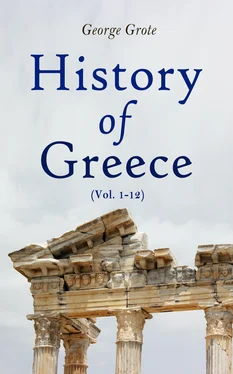Having now finished six volumes of this History, without attaining a lower point than the peace of Nikias, in the tenth year of the Peloponnesian war,—I find myself compelled to retract the expectation held out in the preface to my First Edition, that the entire work might be completed in eight volumes. Experience proves to me how impossible it is to measure beforehand the space which historical subjects will require. All I can now promise is, that the remainder of the work shall be executed with as much regard to brevity as is consistent with the paramount duty of rendering it fit for public acceptance.
London, April 3, 1849.
NAMES OF GODS, GODDESSES, AND HEROES.
Table of Contents
Following the example of Dr. Thirlwall and other excellent scholars, I call the Greek deities by their real Greek names, and not by the Latin equivalents used among the Romans. For the assistance of those readers to whom the Greek names may be less familiar, I here annex a table of the one and the other.
| Greek. |
|
Latin. |
| Zeus, |
|
Jupiter. |
| Poseidôn, |
|
Neptune. |
| Arês, |
|
Mars. |
| Dionysus, |
|
Bacchus. |
| Hermês, |
|
Mercury. |
| Hêlios, |
|
Sol. |
| Hêphæstus, |
|
Vulcan. |
| Hadês, |
|
Pluto. |
| Hêrê, |
|
Juno. |
| Athênê, |
|
Minerva. |
| Artemis, |
|
Diana. |
| Aphroditê, |
|
Venus. |
| Eôs, |
|
Aurora. |
| Hestia, |
|
Vesta. |
| Lêtô, |
|
Latona. |
| Dêmêtêr, |
|
Ceres. |
| Hêraklês, |
|
Hercules. |
| Asklêpius, |
|
Æsculapius. |
A few words are here necessary respecting the orthography of Greek names adopted in the above table and generally throughout this history. I have approximated as nearly as I dared to the Greek letters in preference to the Latin; and on this point I venture upon an innovation which I should have little doubt of vindicating before the reason of any candid English student. For the ordinary practice of substituting, in a Greek name, the English C in place of the Greek K, is, indeed, so obviously incorrect, that it admits of no rational justification. Our own K, precisely and in every point, coincides with the Greek K: we have thus the means of reproducing the Greek name to the eye as well as to the ear, yet we gratuitously take the wrong letter in preference to the right. And the precedent of the Latins is here against us rather than in our favor, for their C really coincided in sound with the Greek K, whereas our C entirely departs from it, and becomes an S, before e , i , æ , œ , and y . Though our C has so far deviated in sound from the Latin C, yet there is some warrant for our continuing to use it in writing Latin names,—because we thus reproduce the name to the eye, though not to the ear. But this is not the case when we employ our C to designate the Greek K, for we depart here not less from the visible than from the audible original; while we mar the unrivalled euphony of the Greek language by that multiplied sibilation which constitutes the least inviting feature in our own. Among German philologists, the K is now universally employed in writing Greek names, and I have adopted it pretty largely in this work, making exception for such names as the English reader has been so accustomed to hear with the C, that they may be considered as being almost Anglicised. I have, farther, marked the long e and the long o (η, ω,) by a circumflex (Hêrê) when they occur in the last syllable or in the penultimate of a name.
PART I.
LEGENDARY GREECE.
Table of Contents
CHAPTER I.
LEGENDS RESPECTING THE GODS.
Table of Contents
The mythical world of the Greeks opens with the gods, anterior as well as superior to man: it gradually descends, first to heroes, and next to the human race. Along with the gods are found various monstrous natures, ultra-human and extra-human, who cannot with propriety be called gods, but who partake with gods and men in the attributes of free-will, conscious agency, and susceptibility of pleasure and pain,—such as the Harpies, the Gorgons, the Grææ, the Sirens, Scylla and Charybdis, Echidna, Sphinx, Chimæra, Chrysaor, Pegasus, the Cyclôpes, the Centaurs, etc. The first acts of what may be termed the great mythical cycle describe the proceedings of these gigantic agents—the crash and collision of certain terrific and overboiling forces, which are ultimately reduced to obedience, or chained up, or extinguished, under the more orderly government of Zeus, who supplants his less capable predecessors, and acquires precedence and supremacy over gods and men—subject, however to certain social restraints from the chief gods and goddesses around him, as well as to the custom of occasionally convoking and consulting the divine agora.
I recount these events briefly, but literally, treating them simply as mythes springing from the same creative imagination, addressing themselves to analogous tastes and feelings, and depending upon the same authority, as the legends of Thebes and Troy. It is the inspired voice of the Muse which reveals and authenticates both, and from which Homer and Hesiod alike derive their knowledge—the one, of the heroic, the other, of the divine, foretime. I maintain, moreover, fully, the character of these great divine agents as Persons, which is the light in which they presented themselves to the Homeric or Hesiodic audience. Uranos, Nyx, Hypnos and Oneiros (Heaven, Night, Sleep and Dream), are Persons, just as much as Zeus and Apollo. To resolve them into mere allegories, is unsafe and unprofitable: we then depart from the point of view of the original hearers, without acquiring any consistent or philosophical point of view of our own. 2For although some of the attributes and actions ascribed to these persons are often explicable by allegory the whole series and system of them never are so: the theorist who adopts this course of explanation finds that, after one or two simple and obvious steps, the path is no longer open, and he is forced to clear a way for himself by gratuitous refinements and conjectures. The allegorical persons and attributes are always found mingled with other persons and attributes not allegorical; but the two classes cannot be severed without breaking up the whole march of the mythical events, nor can any explanation which drives us to such a necessity be considered as admissible. To suppose indeed that these legends could be all traced by means of allegory into a coherent body of physical doctrine, would be inconsistent with all reasonable presumptions respecting the age or society in which they arose. Where the allegorical mark is clearly set upon any particular character, or attribute, or event, to that extent we may recognize it; but we can rarely venture to divine further, still less to alter the legends themselves on the faith of any such surmises. The theogony of the Greeks contains some cosmogonic ideas; but it cannot be considered as a system of cosmogony, or translated into a string of elementary, planetary, or physical changes.
In the order of legendary chronology, Zeus comes after Kronos and Uranos; but in the order of Grecian conception, Zeus is the prominent person, and Kronos and Uranos are inferior and introductory precursors, set up in order to be overthrown and to serve as mementos of the prowess of their conqueror. To Homer and Hesiod, as well as to the Greeks universally, Zeus is the great and predominant god, “the father of gods and men,” whose power none of the other gods can hope to resist, or even deliberately think of questioning. All the other gods have their specific potency and peculiar sphere of action and duty, with which Zeus does not usually interfere; but it is he who maintains the lineaments of a providential superintendence, as well over the phænomena of Olympus as over those of earth. Zeus and his brothers Poseidôn and Hadês have made a division of power: he has reserved the æther and the atmosphere to himself—Poseidôn has obtained the sea—and Hadês the under-world or infernal regions; while earth, and the events which pass upon earth, are common to all of them, together with free access to Olympus. 3
Читать дальше












